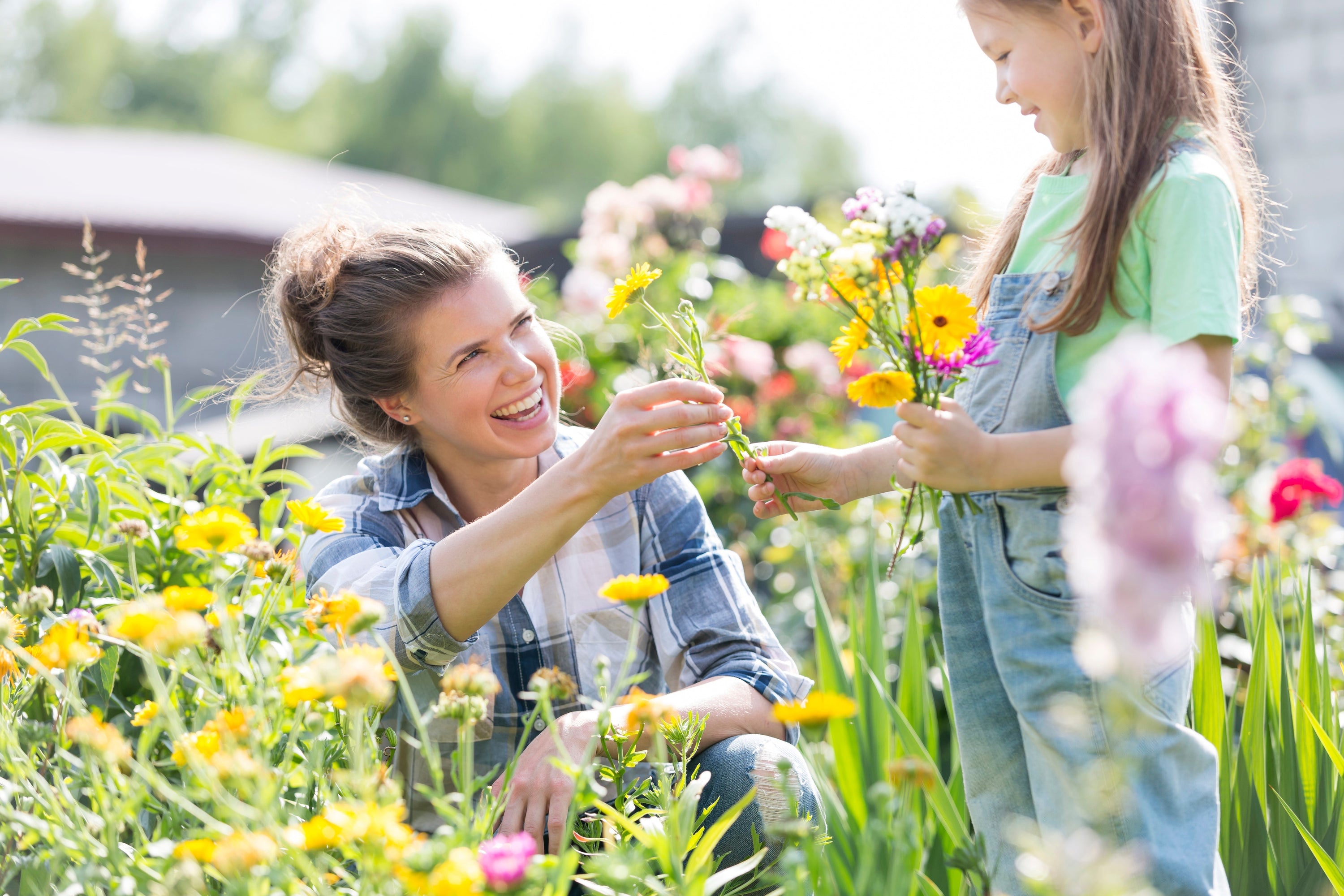
Gardening for Stress Relief with Wildflower Meadows
Cultivating Calm and Joy with Flowers
Life moves fast, and sometimes ridiculously so. Between the constant pings, overflowing inboxes and endless rush from one thing to the next, it's easy to feel less like you're living and more like you're fighting fires. Catching a breath starts to feel like a luxury reserved for yoga retreats or weekend escapes. However, a moment of calm might be waiting for you just right outside your window, on your windowsill, or in a tiny pot on your balcony.
We're talking about flower gardening stress relief.
Yes, flowers are beautiful, but they're also surprisingly good for your headspace. After all, there's something grounding about growing something yourself, especially something that gives back with colour, scent and life. You plant. You wait. You notice. And in that noticing, you slow down. The best part? You don't have to be particularly good at it.
All you need is a little dirt, patience, and this guide to create your own zen garden.
The Benefits of Gardening For Stress Relief
It Offers the Five-Senses Therapy You Didn't Know You Needed
One of the most underrated joys of having a zen garden of flowers is that it engages all five senses. In a world where we either live in our heads or are glued to screens, gardening for stress relief may just be the sensory experience you need to root you in the here and now.
Sight
There's something about watching a plant evolve from seed to bloom or a bee hop from one flower to the next. Seeing nature unfold in your flower meditation garden is a great way to slow your mental pace and pull your attention away from stressors, helping you improve focus and mindfulness, reduce mental fatigue and improve your mood.
Smell
That rich scent of damp soil after a storm or that subtle whiff of lavender hanging in the air taps into your brain's limbic system, which controls emotions and memory. Scents can trigger positive memory, lowering your cortisol levels while encouraging deep breathing a relaxation.
Touch
Running your hands through the soil in your zen garden or brushing against soft petals connects you physically to the earth. It reminds your body what "real" feels like, making it easy for you to ground your thoughts and reinforce patience and presence, all while releasing tension through movement.
Sound
A zen garden isn't silent. It's alive with rustling leaves, buzzing bees, and chirping birds. These sounds create a natural soundscape proven to relax the nervous system, free your mind from mental clutter, bring down your cortisol levels and induce tranquillity in the heart.
Taste
And yes, if you're growing edibles, tasting something fresh from your own meditation garden engages your senses and your pride. Herbs and edible flowers bring a whole new layer of connection to your food while reinforcing a sense of accomplishment.
Curious Kids Will Enjoy It Too
Gardening isn't just for grown-up stress relief. In fact, some of its most devoted practitioners come three feet tall, with muddy knees and boundless curiosity. Give a child a trowel, some seeds, and a bit of earth, and you've created a tiny jungle full of wonders.
Gardening meditation teaches patience (those seeds don't sprout overnight), responsibility (plants need to be watered), and awe (the metamorphosis from caterpillar to butterfly creates lasting impressions). Growing flowers together with kids not only strengthens your bond. It helps you create core memories that shape their character while providing rare, calm moments in nature that screen time can never afford.
It's Good For You And The Planet
Gardening for mental health and stress relief is a great way to help us heal while healing the planet. When you plant pollinator-friendly wildflowers in your zen garden, you're creating mini-habitats for struggling native and honey bees, as well as butterflies, especially now that pollinator populations are dwindling in Australia and beyond.
Small pockets of blooming wildflowers in your zen garden space for meditation could mean huge food and shelter in good times for them. The sweet peas are pretty in appearance and have a fine fragrance that attracts pollinators. Hence, planting it supports biodiversity, helps wild pollinators in finding sustenance and plays a key role in keeping ecosystems healthy. That's wildflower health in action, where the health of the flowers, pollinators, and people is interconnected.
And really, it just feels great to know that your little patch of dirt is doing something good for the world. It gives gardening meditation a whole new purpose and meaning beyond improving your mental health.
Bringing Your Zen Garden To Life
Feeling inspired but unsure how to start? One of the easiest ways to start gardening for stress relief is to plant flower seed mixes.
These are pre-cultivated mixtures that contain species with various colours and heights to bloom at different times and offer different benefits. It is the joy of a wildflower meadow and gardening for mental health, minus the headache of figuring out what works with what.
Why seed mixes work wonders:
- Instant variety: You're planting many flowers in your zen garden, not one species. This means flowers bloom in waves in your garden, giving interest and beauty almost every day.
- Pollinator buffet: Different flowers attract different bees, butterflies and beneficial bugs. A seed mix ensures there's something for everyone in your zen garden and local insect community.
- Low-effort beauty: Seed mixes are for people who want results without working for it. With nothing but scattering, watering, and waiting, your work is done.
- Perfect for small spaces: No need for a big yard. Just a planter box alongside a big pot, the right mix can turn itself into a work of art.
Our Expert Tips To Help Your Wildflowers Bloom
Here are a few soft and stress-free tips to take you through growing a thriving zen garden and your gardening meditation journey.
Provide continuous bloom: Try to grow a mix of flowers whose flowering times differ from each other in your zen garden. While one finishes, another begins; thus, there is always something to be appreciated in colour, scent, or food for pollinators.
Include different flower types and shapes: Various insect species prefer different flower shapes. Daisies, tubes, and bells all attract their pollinators. More diversity equals more activity, and life, in your garden.
Insect-friendly: You are creating a safe environment for those helpful bugs, so don't use any chemical sprays that may harm them. Instead, use natural pest-control methods or just let nature take its course- it'll often work out just fine.
The Takeaway?
The beauty of the garden is that it meets you where you are. You can cultivate a single sweet pea flower in a pot or go full-out with a wildflower wonderland that is therapeutic and healing.
In this process of plant care, you end up caring for yourself too: learning to slow down, listen, and care. You begin to see growth not only in the soil but within yourself-translating into calmness, clarity and confidence.
So, go ahead. Get your hands dirty! Plant something little. Watch it grow as your entire life blossoms with it.
A peaceful little spot of nature awaits right around the corner, just a few seed packs away.
Share

